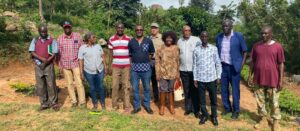My passion is the sustainable commercialisation of Southern African indigenous plant resources to generate positive social, economic and environmental benefits.

When the Southern African Natural Products Trade Association (SANProTA) was formed in 2000 there were no organisations supporting and representing the sector for producers of baobab fruit or marula oil. PhytoTrade Africa, as the association became known was unique, and over the lifetime of the organisation some 200 small businesses and supporting organisations from nine countries in Southern Africa were represented.
Today, there are the Southern African Essential Oil Producers Association, Bio-Innovation Zimbabwe, Natural Products Association of Botswana and Namibian Network of the Cosmetics Industry. This can be taken as an indication of a sector developing and maturing.
Around 2016 PhytoTrade Africa came to an end of an era. This provided an opportunity for evaluation, reflection and reinvention.
Some of the broad observations include that there is a need for a stronger focus on:
- commercial decision making,
- integrating conservation outcomes at a landscape and sector level,
- more focussed and curated incubation,
- acceleration and mentoring services,
- more creative and effective collaboration with traditional knowledge stakeholders,
- transferring competitive technology into the sector,
- innovation in business structure and ownership models,
- and new ways of deploying public and private finance into successful projects.
Some of these “lessons learned” may seem contradictory but it appears that the road to the “Holy Grail” is not an obvious or simple one.

All the above has now led to a small but scalable endeavour we are calling the Kalahari Project. Using a hybrid organisational arrangement we are partnering with a social enterprise in the Ghanzi District of Botswana called Kamela. It works closely with the local San community on a 7,500 hectare farm and with many settlement areas in the area. The project will scale firstly to other carefully selected partner organisations in Botswana, and then also to a network of small businesses and organisations in South Africa and Namibia.
We have kicked off the project with a short list of three species providing at least six novel products which have enormous potential in the natural and organic cosmetics markets, pharmaceutical applications and foods and beverages. In particular, there are fantastic opportunities in the rapidly growing plant-based and vegan protein sectors.
Ximenia Fruits are edible and contain a seed from which a fantastic cosmetic oil is extracted.Resource assessment and biodiversity management plans have been initiated despite some epic rains in the Kalahari recently. This may or may not be due to climate change, but it seems that resource assessments and biodiversity management plans are critical.
From a community, small business and sector perspective diversification through sustainable commercialisation of plants that have thousands of years evolution and tolerance to climate change can bring RESILIENCE and also now with COVID can support diversification for those reliant on tourism.

We are using technologies and processes which are novel to this sector. Our model incorporates aspects of collective ownership of the technologies whilst retaining clear, commercial decision making. This builds on a concept developed some years ago by PhytoTrade Africa called PhytoTech.
Internships with students have provided for extensive literature reviews and insights into new commercial applications and a pipeline of a further thirty products has been identified. A network of potential clients is lined up for engagement.
Along with this a major engagement with the traditional knowledge community is being prepared and a series of meetings will be held as soon as Covid-19 restrictions are lifted and it is safe to meet.
I look forward to updating and providing further information as we progress.






